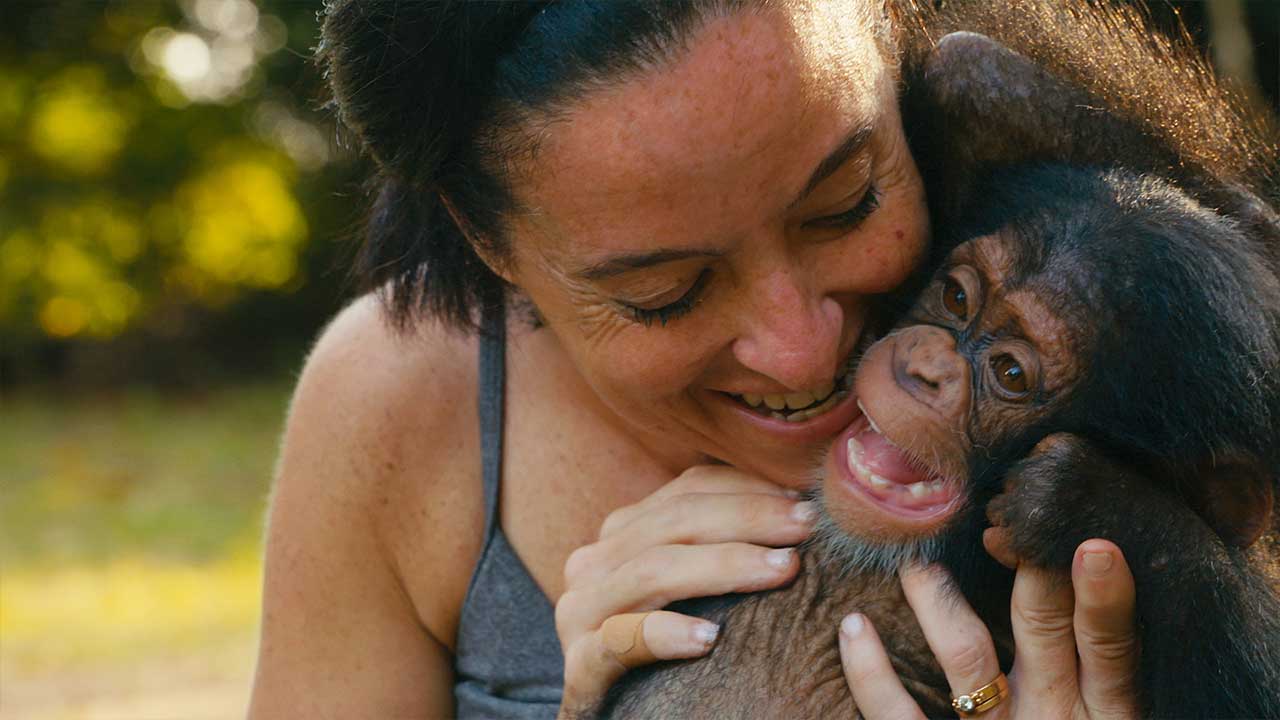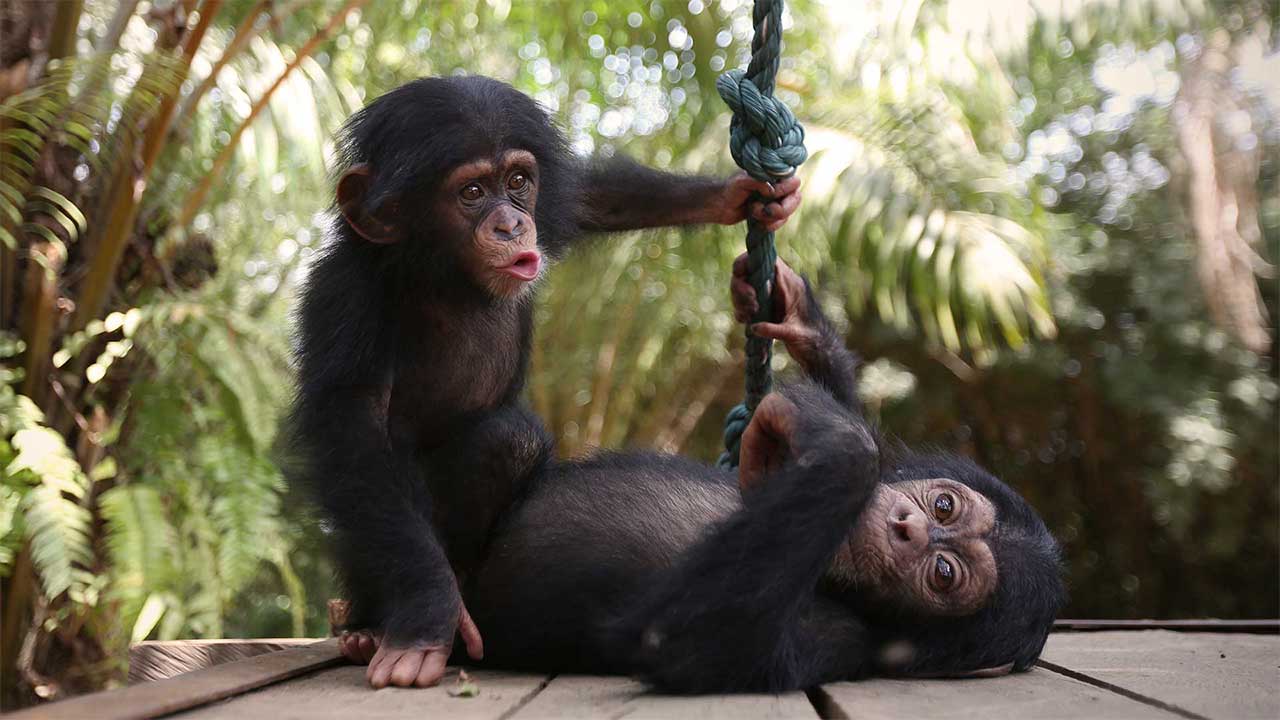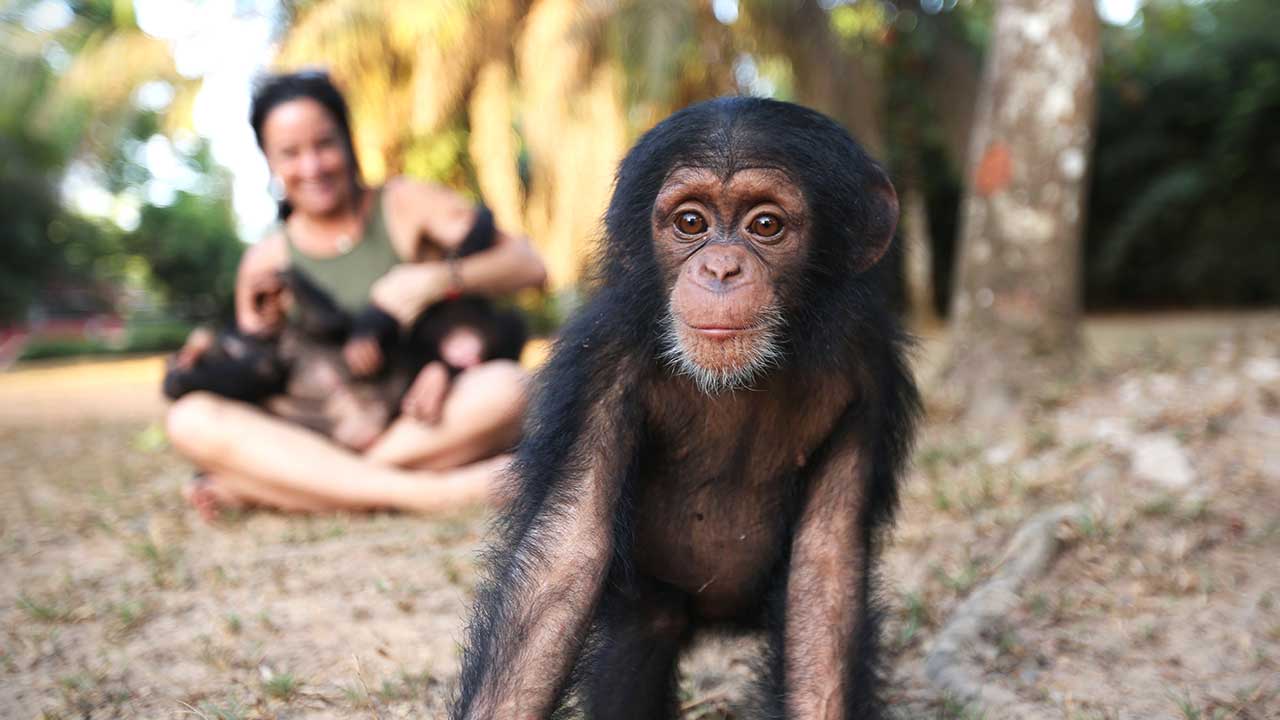Exclusive Interview: 'Baby Chimp Rescue' Care-Givers Jenny and Jimmy Desmond on Their Enlightening New Wildlife Docuseries
Airing as part of BBC America's Wonderstruck strand, Baby Chimp Rescue is an enlightening and emotional three-part documentary series spotlighting Liberia's first and only sanctuary for orphaned chimpanzees. American couple Jenny and Jimmy Desmond have made it their mission to provide a safe space for baby chimps whose mothers have been killed by poachers; the series follows them over 12 months as they try to build a new, more natural habitat for their 29 orphans in a nearby mangrove forest.
Ahead of Baby Chimp Rescue's premiere this Saturday, December 5 at 8pm EST on BBC America, we caught up with the Desmonds to find out more about the show and their incredible work.
How do people tend to respond when they see the chimps on the show?
Jenny Desmond: Everybody always goes: 'Oh my God, they're just like humans!' Which they are, and which is great. We're happy with people thinking that as long as they don't think they're so like humans that they want them as pets. We've gotten very little of that, which means the show did a great job of showing that yes the chimps are with us and we love them, but really they should be in the wild. Overall, the response to the show has been incredible. There are so many nice, loving, generous people out there – it's been unbelievable.
Jimmy Desmond: When we went into filming the show, we did have some trepidation because we were worried about how it might turn out. But the BBC did such an amazing job of telling the full story of what happens here. People have said to us, 'I've never laughed and cried so much while watching a TV show,' or, 'This show really lets you see the best and worst of humanity.' I think it portrays the full picture of our life here but really focuses on how amazing the chimps are and why they're so important.
In the show, we see that many of the chimps who come to you are orphans because their mothers have been killed in front of them. You and your staff then become their care-givers. Do you ever have to draw a line between caring for the chimps and giving them too much human contact?
Jenny Desmond: Well unfortunately, when they get to us, they're not really wild animals any more. They're going to most likely live with us for their lifetimes. So in that sense, letting them get attached to humans is not so much a concern because they're going to live with and be dependent on humans their whole lives. But I would say specifically for the orphans we get, it's really not that difficult a line to draw, because in the wild, they would be with their moms 100% of the time. I mean, especially under the age of one, they would never be out of their moms' reach. So we do try and replicate that as much as possible.
Jimmy Desmond: And even though we sort of act as surrogate moms, they're always interacting with other chimps. We're there to be the adults who break up a fight or provide a lap to fall asleep on or give them a hug when they need it. Physical contact is super-important to their development because in the wild they're attached to their moms 24/7: it's quite different than with [baby] humans. So we provide that kind of safe place for them. But they also have all their chimp friends, and they eventually spend more time with them as they get older, which at the end of the day is what they prefer.
How did you come to make this your life's work?
Jimmy Desmond: We've been here for five years, but we've been working in this field for the past 20. Jenny's been an animal lover her whole life and always wanted to work with animals; I always loved animals but didn't see the right path for me to do that. But then after we got married, we went on a round-the-world trip and had this amazing experience working with orangutans that sort of led us on the path we're on now. I think where we are now is where we're really meant to be. We're living here in Liberia and hoping that we're having a real impact not just on the chimps' lives, but on conservation here and on the communities around us. Liberia is a really important country for conservation in West Africa, so we hope we're doing our small part to help protect this species and help Liberia protect its wildlife.
Is the way you approach conservation a constantly evolving thing? Does it change very rapidly?
Jenny Desmond: I mean, in our minds, this is about a whole global shift. What we're seeing is the world beginning to realize that biodiversity is important not just to wildlife, but to us as humans. I wish that realization would happen overnight but it's not going to! But saying that, a lot has definitely changed here in the last five years. In the beginning it really was about us saying: 'Do you know who these chimps are, do you know why they're important, and do you know what their [endangered species] status is?' Now we're able to push the message out further because we don't feel like we're starting from scratch. I feel like the country is super, super-aware about the chimps now: we have a lot of great regional collaborations and partnerships, as well as some really great international ones. The progress is amazing and we've got a lot of great partners helping us move forward.
Finally, what do you hope people take away from the show?
Jimmy Desmond: I think we hope that people come away being amazed at the chimps: how like us they are, but also how important they are and how each of their individual lives matter. And on top of that, I hope that when people watch the show, they're maybe inspired to go and do something. And that could be in their own community, or it could be going off somewhere and doing something like us, where hopefully they can change the world a little bit for the better.
Are you looking forward to meeting the Desmonds and their baby chimps?